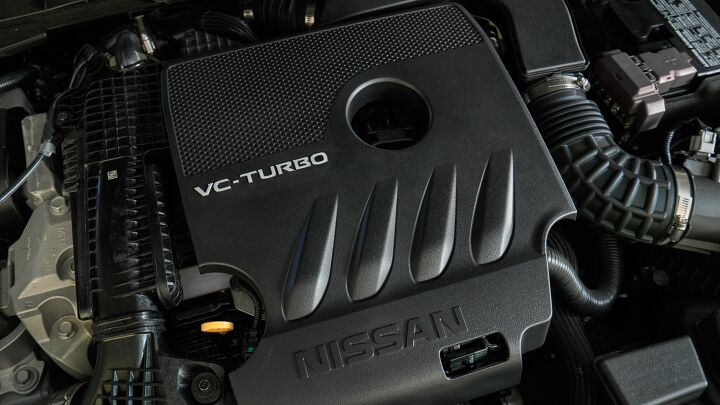The NHTSA is Investigating Nissan's Variable Compression Engine Problems

Nissan hailed its variable compression engines as great for performance and fuel economy, though the real-world benefits of the advanced mills haven’t completely lived up to the hype. They also appear to have issues that could cause a loss of power, knocking sounds, and engine failure in the most extreme cases, leading the National Highway Traffic Safety Administration to open an investigation.
The NHTSA is looking at more than 450,000 Nissan vehicles that use one of its two variable compression engines, including the Altima, Rogue, and Infiniti QX50. Owners have reported all sorts of issues with the 2.0-liter four-cylinder and 1.5-liter three-cylinder engines, but the automaker has not yet issued a recall to address the problems.
Variable compression technology allows the engines to shift their compression ratios to maximize fuel economy or power, depending on the situation. Despite those benefits, Nissan’s engines return only marginally better fuel economy, and the automaker remains the only company using the technology.
Though this is just an investigation at this point, the NHTSA could push for a recall if it determines that there is a defect. The complexity of the engines gives them their notable capabilities, but more complication isn’t always a good thing in mechanical systems. After all, there’s probably a good reason that other automakers haven’t followed Nissan down the variable compression path, and it’s likely because they’re expensive to develop and produce. Their complicated designs could have multiple possible failure points, which is less than desirable for a component that needs to run for tens of thousands of miles.
[Image: Nissan]
Become a TTAC insider. Get the latest news, features, TTAC takes, and everything else that gets to the truth about cars first by subscribing to our newsletter.

Chris grew up in, under, and around cars, but took the long way around to becoming an automotive writer. After a career in technology consulting and a trip through business school, Chris began writing about the automotive industry as a way to reconnect with his passion and get behind the wheel of a new car every week. He focuses on taking complex industry stories and making them digestible by any reader. Just don’t expect him to stay away from high-mileage Porsches.
More by Chris Teague
Latest Car Reviews
Read moreLatest Product Reviews
Read moreRecent Comments
- ToolGuy This thing here is interesting.For example, I can select "Historical" and "EV stock" and "Cars" and "USA" and see how many BEVs and PHEVs were on U.S. roads from 2010 to 2023."EV stock share" is also interesting. Or perhaps you prefer "EV sales share".If you are in the U.S., whatever you do, do not select "World" in the 'Region' dropdown. It might blow your small insular mind. 😉
- ToolGuy This podcast was pretty interesting. I listened to it this morning, and now I am commenting. Listened to the podcast, now commenting on the podcast. See how this works? LOL.
- VoGhost If you want this to succeed, enlarge the battery and make the vehicle in Spartanburg so you buyers get the $7,500 discount.
- Jeff Look at the the 65 and 66 Pontiacs some of the most beautiful and well made Pontiacs. 66 Olds Toronado and 67 Cadillac Eldorado were beautiful as well. Mercury had some really nice looking cars during the 60s as well. The 69 thru 72 Grand Prix were nice along with the first generation of Monte Carlo 70 thru 72. Midsize GM cars were nice as well.The 69s were still good but the cheapening started in 68. Even the 70s GMs were good but fit and finish took a dive especially the interiors with more plastics and more shared interiors.
- Proud2BUnion I typically recommend that no matter what make or model you purchase used, just assure that is HAS a prior salvage/rebuilt title. Best "Bang for your buck"!


































Comments
Join the conversation
"...but more complication isn’t always a good thing in mechanical systems."
"...but more complication is never, ever a good thing in mechanical systems, no exceptions."
FIFY
When I first saw a description of these engines I wondered how Nissan had made such a complex design reliable enough for mass production. Guess it turns out they didn’t. I am surprised the tech didn’t provide more efficiency benefits.